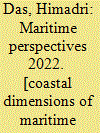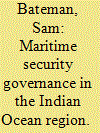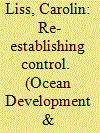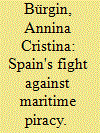| Srl | Item |
| 1 |
ID:
142478


|
|
|
|
|
| Summary/Abstract |
The present text discusses Brazilian's perspectives on South Atlantic security, the prospects of its engagement in fostering maritime security governance in the axis linking the South Atlantic and the Indian Oceans and the role that the India, Brazil and South Africa Dialogue Forum (IBSA) might play in this regard. It addresses Brazil's geostrategic interests and concerns regarding its maritime projection and its perspectives towards security and maritime cooperation within IBSA. Thereafter, it contrasts these perspectives with the priority currently assigned to the South Atlantic in its defense policy and to the political and diplomatic valuation of the South Atlantic Zone of Peace and Cooperation as the proper institutional framework to foster maritime governance in the region. It concludes by pointing out that at present there are no immediate and mid-term incentives strong enough for Brazil to change its primary focus on the South Atlantic to favour the emergence of a bi-ocean governance framework.
|
|
|
|
|
|
|
|
|
|
|
|
|
|
|
|
| 2 |
ID:
189479


|
|
|
|
|
| Publication |
New Delhi, National Maritime Foundation, 2022.
|
| Description |
viii, 275p.pbk
|
| Standard Number |
9788195907908
|
|
|
|
|
|
|
|
|
|
|
|
Copies: C:1/I:0,R:0,Q:0
Circulation
| Accession# | Call# | Current Location | Status | Policy | Location |
| 060329 | 359.54/DAS 060329 | Main | On Shelf | General | |
|
|
|
|
| 3 |
ID:
144122


|
|
|
|
|
| Summary/Abstract |
This paper considers arrangements for providing maritime security in the Indian Ocean Region (IOR) at both the national and regional levels. The main requirement at the regional level is a mechanism or mechanisms for cooperation on maritime security concerns both between regional countries themselves and between these countries and the extra-regional countries that have a legitimate interest in IOR maritime security. At a national level the necessary capacity for providing maritime security includes arrangements for coordination between the various agencies involved and the operational capabilities for maritime law enforcement to provide good order at sea. The paper discusses the relative attributes of a navy or a coast guard to provide these capabilities. It concludes with ideas about how maritime security governance in the IOR might be improved.
|
|
|
|
|
|
|
|
|
|
|
|
|
|
|
|
| 4 |
ID:
139199


|
|
|
|
|
| Summary/Abstract |
In response to the increasing employment of Privately Contracted Armed Security Personnel (PCASP) to protect vessels against pirate attacks, some flag states introduced new regulations that allow the use of PCASP. The introduction of these new regulations was at least in part an attempt to (re)establish state control of violence. This article provides the background and theoretical framework for this special issue, which discusses how states with national registers approached the regulation of PCASP. Summarizing its major findings, the article concludes that even when states attempted to govern the use of PCASP, operational difficulties resulted in significant shortcomings in state control.
|
|
|
|
|
|
|
|
|
|
|
|
|
|
|
|
| 5 |
ID:
129671


|
|
|
|
|
| Publication |
2014.
|
| Summary/Abstract |
The rise of piracy in the Indian Ocean in the first decade of the 21st century prompted international action to protect civilian vessels. This article examines the case of Spain, a major European protagonist in the fight against piracy, leading maritime security governance with official as well as private security forces. It explains Spain's twin-fold approach to counter-piracy, participating through its armed forces in the European Union's Operation Atalanta and deploying armed private security personnel on civilian vessels, an approach with strong support in Spain, but controversial in other European countries. This analysis emphasizes sources of legitimacy, and shows that the two-fold strategy has a high output-legitimacy, supported by interested groups and the Spanish public. Use of both official and private security forces is perceived as the best way to protect lives and national economic interests. Other major European maritime countries - including France, Germany and Netherlands - struggled with these problems, gradually shifting to emulate the Spanish solution. These findings support theoretical assumptions about output-legitimacy; a policy gains legitimacy if involved actors consider it the best way to solve the problem.
|
|
|
|
|
|
|
|
|
|
|
|
|
|
|
|